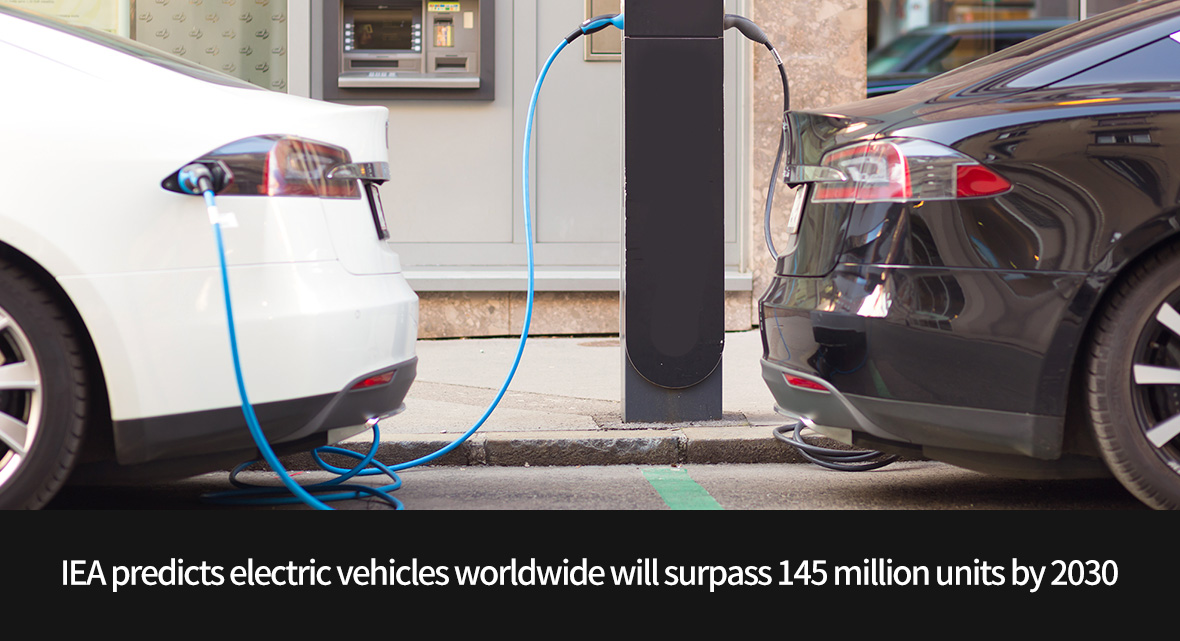 Trends & Reports
Trends & Reports
In a report released in December last year, IHS Market, an U.K. based research company, predicted global sales of battery electric vehicles (BEV) and other EVs this year will be about 3.94 million units, an approximately 70% increase compared to the sales of 2020. The competition to be the first to switch to 100% green cars among global automakers is also heating up.
| IEA: “EVs are set to be a more common sight on the world’s roads in the 2020s”
The global automobile market is indeed leaning more towards EVs these days. In the Global Electric Vehicle Outlook 2021 published by the International Energy Agency (IEA), it is said that “There were 10 million electric cars on the world’s roads at the end of 2020, following a decade of rapid growth”. The report also emphasized, “EVs are set to be a more common sight on the world’s roads in the 2020s.”
Then how many EVs (except two/three wheelers) will be there across the globe in 2030? IEA suggested impressive numbers. “In the Stated Policies Scenario, the EV stock across all modes reaches 145 million in 2030, accounting for 7% of the road vehicle fleet.” According to IEA, the number can even be higher if governments make more efforts to reach climate goals. “In the Sustainable Development Scenario, the global EV fleet reaches 230 million vehicles in 2030, a stock share of 12%”.
It is also noteworthy that “despite the pandemic-related worldwide downturn in car sales in which global car sales dropped 16%”, EVs sales has bucked the trend, proved by the 41% increase of electric car registrations in 2020” according to IEA’s numbers.
| IEA Executive Director urges investment in EV battery production and charging infrastructure
“While they can’t do the job alone, EVs have an indispensable role to play in reaching net-zero emissions worldwide,” said Fatih Birol, Executive Director of the IEA. “Current sales trends are very encouraging, but our shared climate and energy goals call for even faster market uptake,” he added. Birol continued by urging governments to increase investments in battery production and establishment of a widespread and reliable charging infrastructure by using the COVID-19 economic recovery package.
It was stated in the report of IEA that consumer spending on EVs in last year is USD 120 billion, an increase of 50% compared to 2019. However, the share of government support in total expenditure fell for five consecutive years, with a total amount of USD 14 billion. According to IEA, this suggests that although government subsidies are still important for boosting EVs market, the sales are “increasingly being driven more by consumer choice.”
| SK Innovation accelerates global expansion to respond to the explosive growth of EV market
SK Innovation is accelerating EV battery business not only by expanding its existing factories but also through a joint venture with a partner to respond to the booming EV market.
As reported earlier, SK Innovation and Ford signed a MOU to establish BlueOvalSK, a joint venture for EV battery production. The JV will be responsible for producing about 60GWh of EV battery cells and modules per year in the U.S. This is the capacity that can power approximately 600,000 electric pickup trucks, given that on average each truck requires 100kwh of battery.
SK Innovation’s decision to establish BlueOvalSK joint venture with Ford is to strengthen its role in the EV ecosystem, especially North America market, taking a big step towards its goal of being among the TOP 3 battery makers in the world. SK Innovation’s original plan by 2025 was to secure over 125 GWh of annual capcity, but with this JV, the company expects to reach a higher target of 190 GWh per year.










 Youtube
Youtube Facebook
Facebook Instagram
Instagram Linkedin
Linkedin






















